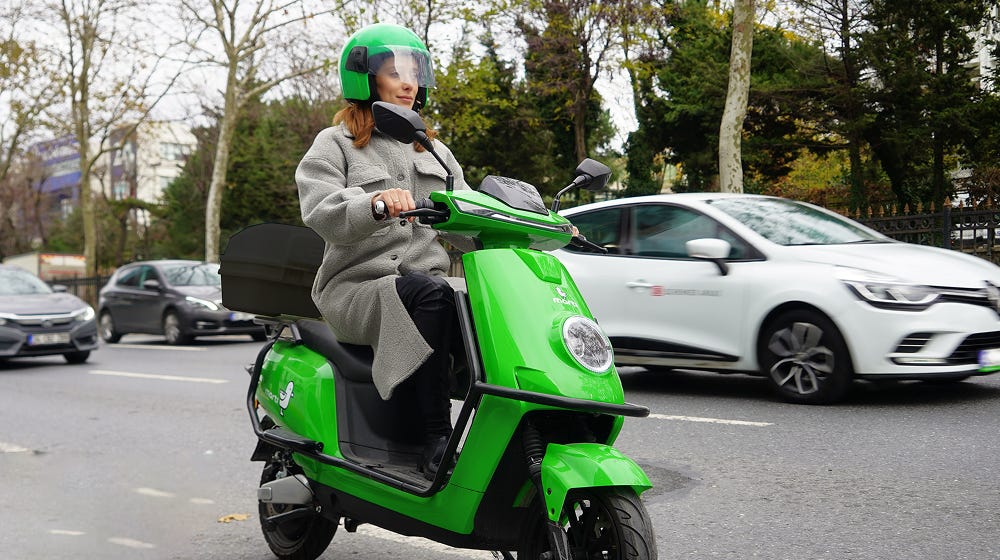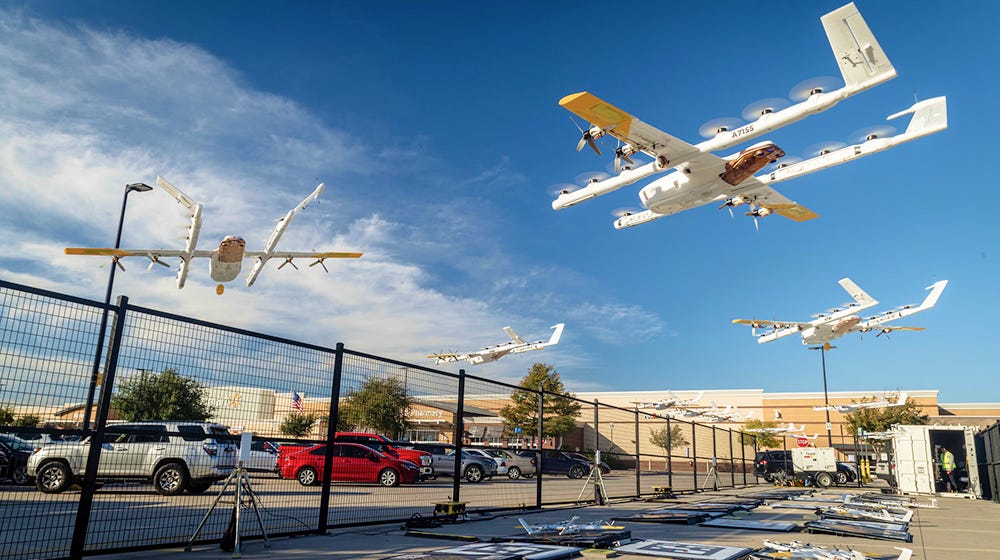Welcome to CoMotion NEWS, your weekly roundup of news and analysis of the mobility revolution. If this email was forwarded, you can sign up here for NEWS.
It’s anybody’s guess what Elon Musk’s falling out with Donald Trump will mean for the stuff we follow, but so far nothing has actually changed. The GOP tax bill was already going to eliminate EV subsidies and climate investments – Trump just happens to have another reason to be enthusiastic about it.
What Trump has actually done is sign a series of executive orders on drones, flying cars and supersonic travel (he’s a fan). Meanwhile, Tesla is days away from kicking off a widely-watched robotaxi trial in Austin but is fighting like hell to keep its crash data secret –– and may already be mourning the absence of a helping hand in the White House.
Also: Chicago and Philadelphia are on the brink of devastating cuts to public transit, Walmart expands its drone delivery service, Amazon is testing humanoid robots to carry boxes from Rivian vans, a startup raises money for AI-powered traffic enforcement and the EU levies big fines on two food delivery apps. Finally, remember SPACs? After a very painful post-pandemic hangover, there are signs of a comeback. Who’d’ve thunk?
What you need to know
Trump signs executive orders on drones: The president signs one order to crack down on unauthorized drones while signing another that seeks to boost the commercial and military drone use by allowing commercial and defense officials to fly drones beyond their range of sight.
…and flying cars and supersonic travel: Another Trump order seeks to reduce regulatory barriers to flying cars while another directs the FAA to eliminate a 50-year-old rule that bars aircraft from traveling faster than the speed of sound. The order calls for regulating noise but not speed, since it is now possible to fly faster than Mach 1 without creating a sonic boom that can be heard on the ground.
High Hopes: Can a Gondola Solve Events Traffic?
With the recent signing of Shohei Otani, traffic to Dodger Stadium, LA's premiere sports venue, is up more than 12% - all without fixed transit infrastructure to handle the surge. In this episode, Nick Perloff-Giles sits down with David Grannis of Zero-Emissions Transit and Michael Manley of gondola manufacturer Leitner-Poma to discuss their project that solves the stadium's congestion by going in one direction: up.
Tesla gets nervous about driverless data: Days before it is scheduled to kick off robotaxi service in Austin, Tesla argues in court that certain information about crashes involving its autonomous driving systems held by the National Highway Traffic Safety Administration should not be publicly disclosed because it will offer its competitors unfair insights into its technology. Meanwhile, Tesla is also trying to block the city of Austin from releasing emails between the company and city officials about the impending robotaxi rollout.
The NHTSA’s position certainly made political sense when Elon Musk was still President Trump’s “first buddy,” but now that that relationship has soured, perhaps the federal agency will become more receptive to calls for data transparency…

Marti marches towards profitability: The latest financial figures from Marti, Turkey’s leading mobility app, shows how maximizing ridership and revenue isn’t necessarily the way to make money in shared mobility. The app, which connects users with ride-hailing and micromobility, saw revenue dip by 6.8% last year but also inched closer to profitability. It attributes some of the improvement to increasing vehicle lifespan, but it also reduced its footprint to focus on cities where its vehicles are getting the most use.
Very bad news for transit in the Windy City: The Illinois legislature fails to come to a deal to fund public transportation in the Chicago area, prompting transit agencies to begin preparing 40% cuts in service. This could devastate public transit in America’s third largest city, with major ramifications for the hundreds of thousands who depend on public transit and the regional economy as a whole.
…there’s still hope for Philly: Philadelphia’s regional transit authority, SEPTA, has similarly said that it will be forced to make nearly 50% cuts in service if state legislators don’t come through with a rescue package by the end of June. SEPTA’s challenges have prompted predictable demands for greater efficiency from transit skeptics, but the agency has a good counterpoint: it boasts the most riders-per-dollar of any major U.S. transit agency.
Australia shaken by scooter death: A British woman visiting Perth is accused of killing a man she hit while riding an e-scooter, allegedly drunk. The case, which could put 24-year-old Alicia Kemp in prison for up to 20 years, has prompted calls for increased regulation of e-scooters in Australia, which already limits the devices to 20 km/h (12.7 mph) on public roads. Meanwhile, Australia saw 1,300 traffic fatalities involving cars in 2024, the country's deadliest year on the roads since 2012.

Walmart and Wing expand partnership: Customers near 100 Walmart stores in five different cities –– Atlanta, Charlotte, Houston, Tampa, Orlando –– will soon be able to get things delivered by drone to their doorstep by Wing, an Alphabet-owned startup. Wing and Walmart have already been offering the service to customers in the Dallas area for nearly two years.
AI-powered traffic enforcement: Obvio, a San Carlos AI startup, is deploying solar‑powered cameras at stop signs to detect driving infractions—like rolling stops and red‑light violations—to automatically flag offenders and has just raised $22 million in Series A funding to expand beyond five Maryland pilot cities. Obvio is also pitching a unique profit model, where it offers the tech to municipalities for free but takes a cut of the fines issued. You can bet that is going to prompt some concerns about profit-driven enforcement…
Battery plant on hold: Japanese battery-maker Automotive Energy Supply Corp. halts construction of a $1.6 billion battery plant in South Carolina, citing “market and policy uncertainty” in the U.S. The company, which was aiming to sell batteries to BMW, which manufactures vehicles nearby, says it plans to resume construction again at some point…
EU hits food delivery service with big fine: Now that Glovo, a Spanish food delivery service, is a wholly owned subsidiary of Berlin-based Delivery Hero, the two apps are no longer expected to compete. But EU investigators determined that between 2018-22, when Delivery Hero was merely a minority shareholder in Glovo, the two were illegally colluding by agreeing not to poach each other’s talent and by divvying up the European market. And for that the parent company is agreeing to pay a €329 million fine. Ouch.
California advances transit-oriented housing bill: The California Senate approves SB 79, a bill that would override local zoning ordinances to allow mid-rise apartment development near transit stations. The law would also empower transit agencies to build high-density housing on land they own, regardless of local zoning, allowing them to both increase ridership and generate revenue through real estate development. The bill still needs to pass the Assembly; Gov. Gavin Newsom appears inclined to support it if it gets to his desk.
Amazon testing humanoid robot workers: The tech giant is building and testing humanoid robots in a San Francisco "humanoid park"—an indoor obstacle course—aiming for them to "spring out" of Rivian vans and handle last‑mile package deliveries alongside human drivers.
The SPAC comeback? Plus Automation, a Santa Clara-based autonomous trucking startup, is going public via a $1.2 billion SPAC merger with Churchill Capital Corp IX, backed by veteran Wall Street dealmaker Michael Klein; the deal injects approximately $300 million to support the commercial rollout of its autonomous trucks by 2027.
You may recall that SPAC IPOs were all the rage during the pandemic –– 613 in 2021 alone –– but they definitely went out of fashion, at least in part due to some very prominent failures. There were only 31 in 2023 and 57 in 2024. But there are signs of a comeback: the SPAC offerings this year have already matched last year’s total and have already generated 7x ($7.71 billion) the deal volume.
Autonomous Vehicles in the European Union
📍 Room 5E2 Spinelli, European Parliament, Brussels 📅 July 2, 2025
Robotaxis are increasingly gaining traction in big American cities. But what about in Europe? CoMotion joins European Parliament Member Pierfrancesco Maran for a virtual meeting at 09:30 to 11:00 CET on June 18 to explore current and planned autonomous vehicle deployments in the E.U. Register here.
A second in-person session will take place at the European Parliament at 15:00 to 17:00 CET on July 2 with a discussion on the current state of AVs in Europe and a deep dive on AV policy and financing in the E.U. Register here.
ICYMI
We revealed the CoMotion MIAMI ‘25 Impact Report!
Explore the standout themes and insights from this year’s edition — featuring expert perspectives on:
🏟️ Mega events and their impact long after the final whistle
💰 Financing sustainable urban transport, and innovative funding models
🚢 ✈️ The future of ports and airports, and how digital transformation is enabling smarter operations and improving the passenger experience
🤖 The path ahead for autonomy and advanced aerial mobility … and much more shaping the future of movement.
📌 Meet this year’s ICEX Spanish delegation of 9 cutting-edge companies, and discover what sets them apart.
🏆 See who took home the Miami-Dade County DTPW's Mobility Champion Awards, and explore pitches from the finalists of the Miami-Dade Innovation Authority’s (MDIA) fourth Public Innovation Challenge.
What we’re reading
Where transit is bouncing back: CityLab compiles transit data from 33 cities that show striking differences in post-pandemic ridership. In North and South America, ridership remains far below pre-Covid levels, but in many European and Asian cities transit systems have made near full recoveries. Some –– Madrid, Paris, Hong Kong –– are now exceeding their pre-pandemic ridership. But why?
A look at driverless trucking in China: BBC takes a ride on one of PonyAI’s fleet of driverless freight trucks in China. Right now the technology is simply making things easier on the human drivers, whose presence is still required due to government regulation. But it’s not hard to imagine what PonyAI has in mind for the drivers when it promises big reductions in labor costs.
CoMotion's mobility goodness brought to you by:
Jack Craver,
Editor, CoMotion NEWS
jcraver@comotionglobal.com
Write to us if you would like to suggest content for our next newsletter!
Partner with us
Our events CoMotion LA, CoMotion MIAMI, and the Monaco Hydrogen Forum represent a unique opportunity to build global awareness in the industry. Build influence, elevate your brand, and connect with ground-breaking companies and public sector leaders.
“It's really exciting to be at this year's CoMotion, with the best, most creative, and innovative minds together thinking about solutions on how we advance transportation.” - Laura Rubio Cornejo, General Manager, LADOT
Email us if you are interested in learning more.
YouTube | LinkedIn | Podcast | X | Instagram





